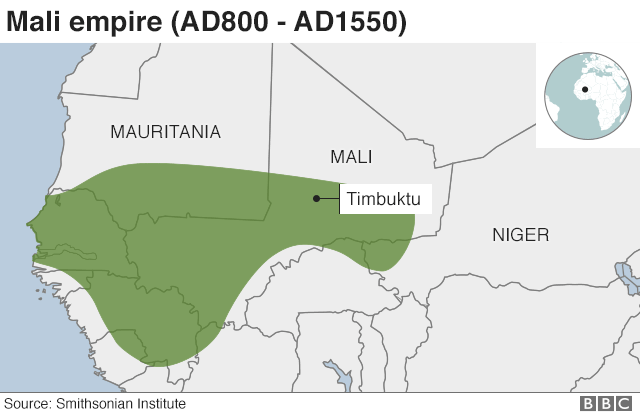Amazon founder Jeff Bezos is the richest man in the world, according to the 2019 Forbes billionaires' list released this week. With an estimated fortunate of $131bn (£99bn) he is the wealthiest man in modern history.
But he is by no means the richest man of all time.
That title belongs to Mansa Musa, the 14th Century West African ruler who was so rich his generous handouts wrecked an entire country's economy.
"Contemporary accounts of Musa's wealth are so breathless that it's almost impossible to get a sense of just how wealthy and powerful he truly was," Rudolph Butch Ware, associate professor of history at the University of California, told the BBC.
Mansa Musa was "richer than anyone could describe", Jacob Davidson wrote about the African king for Money.com in 2015.
In 2012, US website Celebrity Net Worth estimated his wealth at $400bn, but economic historians agree that his wealth is impossible to pin down to a number.
The 10 richest men of all time
- Mansa Musa (1280-1337, king of the Mali empire) wealth incomprehensible
- Augustus Caesar (63 BC-14 AD, Roman emperor) $4.6tn (£3.5tn)
- Zhao Xu (1048-1085, emperor Shenzong of Song in China) wealth incalculable
- Akbar I (1542-1605, emperor of India's Mughal dynasty) wealth incalculable
- Andrew Carnegie (1835-1919, Scottish-American industrialist) $372bn
- John D Rockefeller (1839-1937) American business magnate) $341bn
- Nikolai Alexandrovich Romanov (1868-1918, Tsar of Russia) $300bn
- Mir Osman Ali Khan ( 1886-1967, Indian royal) $230bn
- William The Conqueror (1028-1087) $229.5bn
- Muammar Gaddafi (1942-2011, long-time ruler of Libya) $200bn
Source: Money.com, Celebrity Net Worth
The golden king
Mansa Musa was born in 1280 into a family of rulers. His brother, Mansa Abu-Bakr, ruled the empire until 1312, when he abdicated to go on an expedition.
According to 14th Century Syrian historian Shibab al-Umari, Abu-Bakr was obsessed with the Atlantic Ocean and what lay beyond it. He reportedly embarked on an expedition with a fleet of 2,000 ships and thousands of men, women and slaves. They sailed off, never to return.
Some, like the late American historian Ivan Van Sertima, entertain the idea that they reached South America. But there is no evidence of this.
In any case, Mansa Musa inherited the kingdom he left behind.
Under his rule, the kingdom of Mali grew significantly. He annexed 24 cities, including Timbuktu.
The kingdom stretched for about 2,000 miles, from the Atlantic Ocean all the way to modern-day Niger, taking in parts of what are now Senegal, Mauritania, Mali, Burkina Faso, Niger, The Gambia, Guinea-Bissau, Guinea and Ivory Coast .
With such a large land mass came great resources such as gold and salt.
During the reign of Mansa Musa, the empire of Mali accounted for almost half of the Old World's gold, according to the British Museum .
And all of it belonged to the king.
"As the ruler, Mansa Musa had almost unlimited access to the most highly valued source of wealth in the medieval world," Kathleen Bickford Berzock, who specializes in African art at the Block Museum of Art at the Northwestern University, told the BBC.
"Major trading centres that traded in gold and other goods were also in his territory, and he garnered wealth from this trade," she added.

